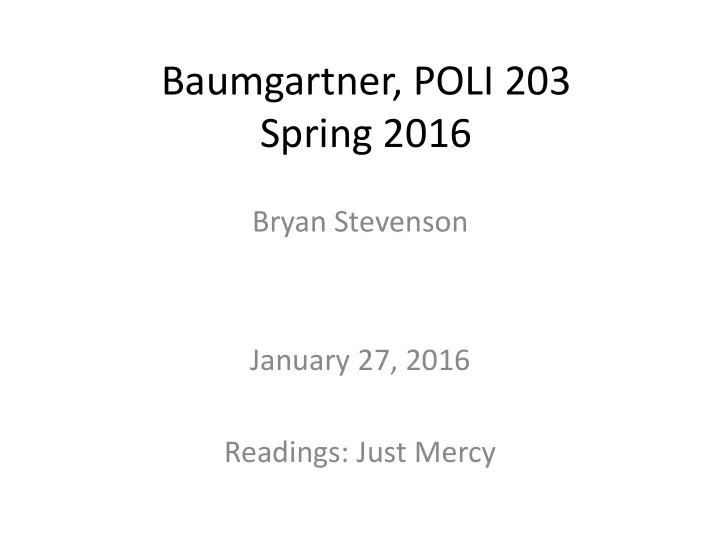

Baumgartner, POLI 203 Spring 2016 Bryan Stevenson January 27, 2016 Readings: Just Mercy
Catch-up, announcements • Helen Spielman , how a “regular person” can make a difference, at least to a few individuals • Take me to lunch: poli sci department has funds for that, email Susan Heske. Glad to do it any time, groups small enough to talk. • Bring your friends to the talk on Monday, and bring your questions. Ray Hinton will be there, as well as Steven Chu, a staff attorney at the Equal Justice Initiative. See www.eji.org.
Venue-Shopping and Jury Bleaching • Venue-changing at the discretion of the judge. • Many southern counties are high in Af-Am populations, particularly rural Alabama. Stevenson’s client, Walter McMillan, moved from Monroe County (40% Af-Am) to Baldwin County (on the coast, 9% Af-Am, not to other neighboring counties 40-75% Af-Am) (pp. 59ff) • Judge: Robert E Lee Key… • If the judge believes you to be a “drug kingpin” and he is a crusader in the “war on drugs” then his goal is clear…
Peremptory Strikes and Batson • NC: Each side gets 12 strikes for no cause • However, in Batson v. Kentucky (1986) the USSC said that strikes for purely racial reasons are not allowed. • But what is the standard? • The striking side must proffer a “racially neutral” reason. – Note, it does not have to be reasonable. – The decision has almost never led to a successful challenge – Jury bleaching is currently in front of the USSC, as it is so rampant. All for NC RJA cases won when statistical patterns were considered.
Recent news relevant to our class, and to Bryan Stevenson’s work: • https://www.washingtonpost.com/opinions/b arack-obama-why-we-must-rethink-solitary- confinement/2016/01/25/29a361f2-c384- 11e5-8965-0607e0e265ce_story.html
How Harsh is Harsh Enough? • Obviously there is no single answer • But from 1970s through the mid- to late- 1990s, we got harsher and harsher. • It is worth thinking carefully about why we did that.
Once in Prison, no Rights? • Prisoners can be subjected to reduced privileges, solitary confinement, etc, on the basis of very little evidence and little to no due process. • On the outside, these punishments would be for new felonies. • On the inside, it might be for very small infractions. • President Obama’s proposal: reduce initial solitary confinement from 365 days down to 30. Why was it so high in the first place?
Homicides are common, severe punishments are selective • The issue is not whether to punish criminals. Certainly, we have to punish, we have to protect society from violent sociopaths, and we have to protect prison guards and others who work with these people. • But the question is do we do so equitably… • Let’s review some basic facts about how common homicide is. Given our national epidemic of homicide, which individuals get this very harsh treatment? We’ll come back to that later, but first, let’s understand homicide. (See other slides)
Recommend
More recommend